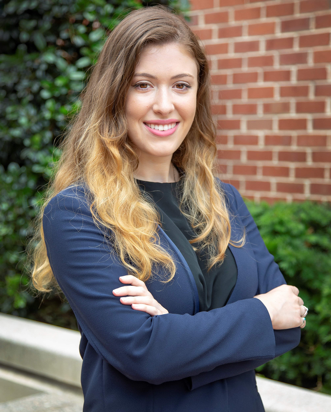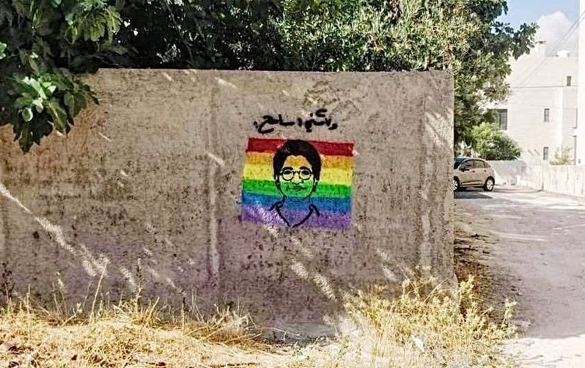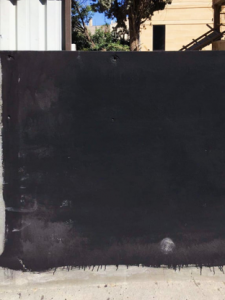
Lara Bellone d’Altavilla has extensive experience working with refugees in Jordan, Greece, and the United States, developing her knowledge on the global refugee crisis. Since September 2019, Bellone has been located in Amman, Jordan. Bellone is a Project Assistant with a Jordanian NGO working on projects enhancing economic opportunities to youth and women during COVID-19. She has worked on projects focusing on disinfection services in public spaces and hygiene awareness to vulnerable communities. Her fieldwork throughout Amman has allowed her to meet different communities and learn new areas of the city.
In her free time, Bellone is a freelance writer covering social justice issues and politics surrounding the Middle East. Bellone has been officially published by the Jordan Times and posts other pieces on GRLبنت (GRLbint). Bellone is a co-founder and content writer for GRLبنت, which is a social media platform sharing travel, cultural experiences, and social justice issues taking place in Jordan. GRLبنت pieces have been featured on UNICEF’s Voices of Youth blog platform. Bellone interned with Save the Children Jordan in the Fall which gave her experience working with local communities in Northern Jordan. Lastly, Bellone volunteered in Lesvos, Greece with HELP International in 2017 where she witnessed the effects that violence has on refugees. Being in this high-risk environment gave her first-hand experience working in an emergency crisis. Bellone is of Syrian and Italian ethnicity.
An Egyptian LGBTQ Activist’s Death
Sarah Hegazi, an LGBTQ activist, was arrested for ‘homosexuality and sexual deviation’ in 2017 after waving the Pride Flag at an Egyptian concert. She was tortured in prison where she was raped and electrocuted by prison guards. Hegazi’s fearless act instantly made her an LGBTQ icon in the Middle East and North Africa (MENA) and became a symbol for gender and sexuality equality in the region. After her imprisonment, she was driven into exile in Canada where she suffered from depression. She wrote, “I became afraid of everyone. Even after my release, I was still afraid of everyone, of my family and of friends and of the street. Fear took the lead.”

On June 13, 2020, Sarah committed suicide expressing in one of her last posts, “I tried to survive and I failed, forgive me. The experience was tough and I’m too weak to resist, forgive me.” The vulnerability of LGBTQ individuals throughout the Middle East ranges with Egypt being highly discriminatory towards the LGBTQ community. This is particularly troubling since Egypt is in the heart of the MENA region and is culturally connected with other countries, including Lebanon and Jordan, making Hejazi’s death a heavy loss for many in the region. In certain MENA countries, to speak out for LGBTQ rights is an act of bravery that could result in harsh punishments similar to those Hejazi experienced or worse.
Fighting for LGBTQ Rights in MENA
LGBTQ communities throughout the world are fighting for equal rights and working to have their voices heard. Excitingly, in June, 2020 the United States passed a historical law prohibiting sexual discrimination in the workplace against LGBTQ and transgender workers. However, it is important to note that LGBTQ activism in the United States is privileged compared to other countries.
We must remember that LGBTQ individuals, including in the Middle East, are struggling to find safe spaces and trustworthy friends to be open with. This fear is due to societal pressure and governments that suppress LGBTQ rights. This was apparent after a mural in Amman, Jordan commemorating Hegazi’s death was covered by the Jordanian Municipality overnight due to it being too ‘controversial’. The overall reaction to Hejazi’s death in the MENA region was apathetic with many writing merciless comments on social media. This was devastating for the LGBTQ community since Hejazi was one of the few public queer female figures in the MENA region. Sarah Hegazi is the story of so many other LGBTQ Arab individuals whose voices have not been heard since they are shunned by their communities.

The Meaning of Acceptance
For individuals fleeing persecution, resettling in more accepting countries appears to be the most hopeful solution. Yet, activists explain that these individuals experience harsh realities upon resettlement including a lack of economic and employment opportunities. Hegazi suffered from Post-Traumatic Stress Disorder (PTSD) after her imprisonment in Egypt which continued after she moved to Canada. Political refugees often face isolation and lack access to proper services after resettlement, therefore, it is important for newcomers to feel welcomed and accepted by their new communities.
Expressing acceptance to those who are different from you will prevent another story like this from happening. If you know anyone who is experiencing mental health struggles, assist them in finding the proper services they need and deserve. It is important to be aware of local actors and organizations that provide support services to LGBTQ individuals and those suffering with mental health issues. Further, is important to be aware and involved with newly resettled refugees/migrants in your community and to welcome them with open arms.
Sources
Hegazi, Sarah. “A Year After the Rainbow Flag Controversy.” Mada Masr, Mada Masr, Sept.
2018, madamasr.com/en/2020/06/15/opinion/u/a-year-after-the-rainbow-flag-controversy/.
Kilani, Hasan. LGBTQ Activist in Jordan, 30 June 2020, https://twitter.com/HasanAmman
Liptak, Adam. “Civil Rights Law Protects Gay and Transgender Workers, Supreme Court Rules.” The New York Times, The New York Times, 15 June 2020, www.nytimes.com/2020/06/15/us/gay-transgender-workers-supreme-court.html.
Resch, Christopher. “Obituary: Egyptian LGBTQ Activist Sarah Hegazy: ‘How Can I Survive in a Society Based on Hate?”.” Qantara.de, Qantara.de, 19 June 2020, en.qantara.de/content/obituary-egyptian-lgbtq-activist-sarah-hegazy-how-can-i-survive-in-a-society-based-on-hate?page=0%2C1.
Photo credit: Lara Bellone d’Altavilla, Edited by Sam Sykes
Disclaimer
The opinions expressed in this publication are those of the authors. They do not purport to reflect the opinions or views of IVolunteer International.
IVolunteer International is a 501(c)3 tech-nonprofit registered in the United States with operations worldwide. Using a location-based mobile application, we mobilize volunteers to take action in their local communities. Our vision is creating 7-billion volunteers. We are an internationally recognized nonprofit organization and is also a Civil Society Associated with the United Nations Department of Global Communications. Visit our profiles on Guidestar, Greatnonprofits, and FastForward.


